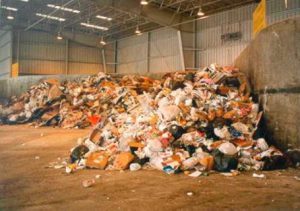Food is wasted along the many routes in our food system as it is grown, processed, transported, sold, stored, and prepared. According to the Environmental Protection Agency, the U.S. generates more than 37 million tons of food waste annually, 95 percent of which ends up in landfills or incinerators. That amounts to over 200 pounds of wasted food per every American every year!
Food waste in landfills combines with anaerobic conditions (lack of air) to create methane, a powerful greenhouse gas 25 times more harmful than carbon dioxide. Landfills are responsible for 18 percent of total methane emissions in the U.S., which contributes significantly to climate change.

Waste waiting for the landfill. Ninety-five percent of the 37 million tons of food waste we produce annually ends up in landfills, when combined with anaerobic conditions, generates methane. Photo by Heidi Copeland.
Nationally, we can prevent and recover food waste by implementing techniques such as standardized food labeling, streamlined donations to foodbanks, the creation of secondary grocers, industrial composting, clean energy creation through treatment plant digestion, business and consumer education, and changing overall food policy.
But as a gardener, what can you do to help? If you grow fruits and vegetables, you are already helping, as this means the food from your garden did not have to travel long distances to get on your dinner table. If you actively compost your kitchen scraps, you are also helping, as Americans throw out nearly 40 percent of food purchased. Here are a few other simple life-style changes you might want to try:
- Purchase more locally produced food. Buying local not only supports local farmers, but the food most likely used fewer resources than non-local food on its way to market.
- Learn canning and pickling techniques. Homegrown fruits and vegetables are as fresh as you can get, and canning can then preserve this food for months.
- Store food properly and keep perishables and leftovers in plain sight in the refrigerator so you see them every time you open the door. Investing in a good set of clear glass reusable containers can securely store leftovers, make them easier to identify, and can be safely heated for quick consumption.
- Don’t throw out something just because it is past the date on the label. Unless it is baby food or formula – which federal law mandates be dated to ensure consumption when most nutritious – these dates refer only to peak quality. If the items do not show signs of spoilage, such as an off odor, texture, flavor, they are safe to consume.
- Cool Season Annual Herbs to Plant in December - December 11, 2025
- The Dirt on Compost: Hot and Worm Composting at Home - October 30, 2025
- Fall Gardening Spotlight: Collard Greens - October 3, 2025
